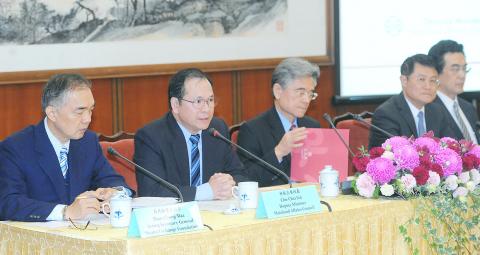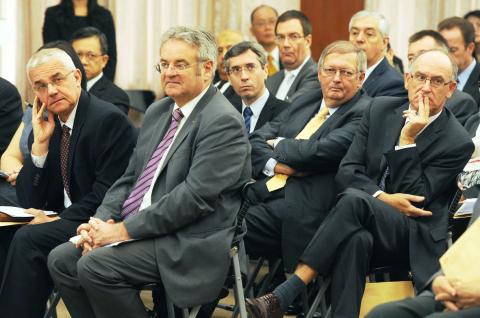The APEC leaders’ summit in Beijing this year would be the most suitable occasion for a meeting between President Ma Ying-jeou (馬英九) and Chinese President Xi Jinping (習近平) because it would allow China to interpret the gathering as a “domestic affair,” Mainland Affairs Council (MAC) Deputy Minister Lin Chu-chia (林祖嘉) said.
Lin made the comment at a meeting of foreign envoys at the Ministry of Foreign Affairs in response to a question EU Representative to Taiwan Frederic Laplanche raised about a possible Ma-Xi get-together. The meeting was to brief the envoys on the agreements on meteorological cooperation and earthquake monitoring signed during the 10th high-level cross-strait talks on Feb. 27 in Taipei.
Several envoys inquired about the possibility of a Ma-Xi meeting, a topic discussed when MAC Minister Wang Yu-chi (王郁琦) met with China’s Taiwan Affairs Office Minister Zhang Zhijun (張志軍) on Feb. 11 in Nanjing, China.

Photo: Wang Min-wei, Taipei Times
“As the next APEC summit is to be held in Beijing, it would help create a context where both sides of the Taiwan Strait could have their own interpretation of the nature of the meeting,” Lin said.
The Democratic Progressive Party (DPP) was quick to criticize his comments.
DPP spokesman Lin Chun-hsien (林俊憲) questioned Ma’s eagerness to meet with Xi, saying that Ma should prioritize the nation’s economy above everything else, including his place in history.

Photo: Wang Min-wei, Taipei Times
DPP Legislator Chen Chi-mai (陳其邁) called on Lin to step down.
“Which country does Lin work for? Is the Ma administration really so desperate to meet with Xi … that it is willing to hand over Taiwan’s sovereignty?” Chen said.
The council later said that a Ma-Xi meeting would not be an international or domestic affair, but a “cross-strait one.”
“The government remains adamant that such a meeting must not undermine the nation’s dignity and stances on sovereignty issues, and could only be held in a way that is conducive to the advancement of social well-being and cross-strait rapprochement,” the council said.
Zhang dismissed Lin’s suggestion when questioned by reporters on the sidelines of the 12th National People’s Congress in Beijing.
“We should find another place [for a meeting], since it only concerns the two sides of the Strait, and during which only cross-strait matters will be discussed. It is not necessary to meet at an international occasion,” he said.

US President Donald Trump yesterday announced sweeping "reciprocal tariffs" on US trading partners, including a 32 percent tax on goods from Taiwan that is set to take effect on Wednesday. At a Rose Garden event, Trump declared a 10 percent baseline tax on imports from all countries, with the White House saying it would take effect on Saturday. Countries with larger trade surpluses with the US would face higher duties beginning on Wednesday, including Taiwan (32 percent), China (34 percent), Japan (24 percent), South Korea (25 percent), Vietnam (46 percent) and Thailand (36 percent). Canada and Mexico, the two largest US trading

ACTION PLAN: Taiwan would expand procurement from the US and encourage more companies to invest in the US to deepen bilateral cooperation, Lai said The government would not impose reciprocal tariffs in retaliation against US levies, President William Lai (賴清德) said yesterday, as he announced five strategies to address the issue, including pledging to increase Taiwanese companies’ investments in the US. Lai has in the past few days met with administrative and national security officials, as well as representatives from various industries, to explore countermeasures after US President Donald Trump on Wednesday last week announced a 32 percent duty on Taiwanese imports. In a video released yesterday evening, Lai said that Taiwan would not retaliate against the US with higher tariffs and Taiwanese companies’ commitments to

‘SPECIAL CHANNEL’: Taipei’s most important tasks are to stabilize industries affected by Trump’s trade tariffs and keep negotiations with Washington open, a source said National Security Council Secretary-General Joseph Wu (吳釗燮) arrived in the US for talks with US President Donald Trump’s administration, a source familiar with the matter said on Friday. Wu was leading a delegation for a meeting known as the “special channel,” the Financial Times reported earlier. It marked Trump’s first use of the channel since returning to the White House on Jan. 20. Citing a source familiar with the matter, the Financial Times reported that Minister of Foreign Affairs Lin Chia-lung (林佳龍) was also a part of the delegation. The visit came days after China concluded war games around Taiwan and amid Trump’s

CHIP EXCEPTION: An official said that an exception for Taiwanese semiconductors would have a limited effect, as most are packaged in third nations before being sold The Executive Yuan yesterday decried US President Donald Trump’s 32 percent tariff on Taiwanese goods announced hours earlier as “unfair,” saying it would lodge a representation with Washington. The Cabinet in a statement described the pledged US tariffs, expected to take effect on Wednesday next week, as “deeply unreasonable” and “highly regrettable.” Cabinet spokeswoman Michelle Lee (李慧芝) said that the government would “lodge a solemn representation” with the US Trade Representative and continue negotiating with Washington to “ensure the interests of our nation and industries.” Trump at a news conference in Washington on Wednesday announced a 10 percent baseline tariff on most goods